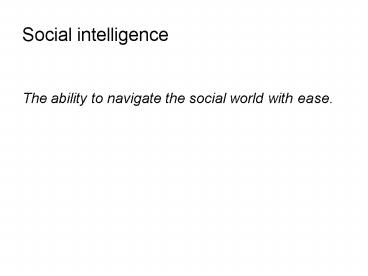Social intelligence - PowerPoint PPT Presentation
1 / 31
Title:
Social intelligence
Description:
interpreting others' behaviour in terms of their internal states ('mentalising') predicting how others will feel, think or behave ... 'Falls for practical jokes' ... – PowerPoint PPT presentation
Number of Views:4431
Avg rating:3.0/5.0
Title: Social intelligence
1
Social intelligence
- The ability to navigate the social world with
ease.
2
Social Intelligence involves
- interpreting others behaviour in terms of their
internal states (mentalising) - predicting how others will feel, think or behave
- influencing others mental states and behaviour
in goal-relevant ways - SI overlaps with emotional intelligence, but is
not the same.
3
Domains of social intelligence
- Individual recognition
- Emotion recognition
- Reciprocity, cooperation
- Hierarchy and status negotiation
- Ingroup/outgroup distinctions
- Empathy
- Inferring others mental states
- Language, conversation
4
Neurological and developmental syndromes with
social deficits
- Autism/Aspergers Syndrome
- Orbitofrontal cortex damage from head trauma
- Frontotemporal dementia
- Bilateral amygdala damage
- Congenital cerebellum damage (Joubert Syndrome,
Dandy-Walker Syndrome) - and many others
5
Orbitofrontal, medial lateral frontal cortex
6
Social deficits following orbitofrontal damage
- Conversational pragmatics impaired
- Lack of turn-taking, poor use of relevance
- Poor use of common ground
- Verbally inappropriate
- Difficulty with nonverbal social cues
7
What happens when social intelligence breaks down?
- Difficult for individual to hold a job
- Difficult to maintain relationships
- Family members feel misunderstood/frustrated
- Difficult for individual to maneuver successfully
in society
8
Social vulnerability
- Easily deceived
- Credulous
- Prey to falling for scams
9
How to measure social intelligence?
- Requires tests across multiple domains
- Tests of social inference
- Emotion recognition
- Ask family members/carers
- Measuring gullibility?
10
Example of social inference test
- A faux pas occurs when someone says something
awkward, hurtful or insulting to another person,
not realizing that they should not say it. - Recognizing a faux pas requires both empathic
understanding and belief attribution.
11
- Jill had just moved into a new apartment. Jill
went shopping and bought some new curtains for
her bedroom. When she had just finished
decorating the apartment her best friend, Lisa,
came over. Oh, those curtains are horrible,
Lisa said. I hope youre going to get some new
ones! Jill asked, How do you like the rest of
my bedroom?
12
- Tim was in a restaurant. He spilled some coffee
on the floor by accident. Ill get you another
cup of coffee, said the waiter. The waiter was
gone for a while. Jack was another customer in
the restaurant, standing by the cashier waiting
to pay. Tim went up to Jack and said, I spilled
coffee over by my table. Can you mop it up?
13
Reading the Eyes in the Mind Task(Baron-Cohen et
al., 1997)
- Observing Daydreaming
Unconcerned Concerned
14
Orbitofrontal focus of atrophy in frontotemporal
dementia
Severe OFC atrophy
Moderate OFC DFC atrophy
Normal brain
15
Symptoms of orbitofrontal damage from
frontotemporal dementia (FTD)
- change in personality
- lack of empathy
- socially inappropriate behavior
- often perform normally on tests of frontal lobe
function
16
Research questions
- Do patients with frontotemporal dementia have a
measurable deficit in social intelligence? - What is the relationship between patients social
cognitive deficits and their behavioural
dysfunction?
17
Patient and control characteristics
18
Control Norms for Performance on Social Inference
Tests
19
Alzheimers Patient Performance on Social
Inference Tests
No significant differences.
20
FTD Patient Performance on Social Inference Tests
21
Correlations between social measures and
neuropsychological test measures in FTD
p lt 0.05 p lt 0.01
22
Social inference deficits in FTD
- FTD patients were significantly impaired on all
social inference tasks - Faux Pas Task performance correlated most highly
with degree of patients behavioural disturbance
23
How to measure social vulnerability?
- How to quantify an individuals tendency to fall
for scams?
24
R.M. bilateral orbitofrontal and anterior
temporal lobe damage
25
Cheater detection
- Social exchange rule If you ate the dinner I
cooked, you wash the dishes. - Who would you want to check?
Person 1
Person 2
Person 3
Person 4
26
Precaution reasoning
- Precaution rule
- If you work with toxic chemicals, wear a face
mask. Who would you want to check?
Person 1
Person 2
Person 3
Person 4
Face mask or no?
Face mask or no?
Works with toxics or no?
Works with toxics or no?
27
Norms collected on reasoning problems
correct
28
Selective impairment of social exchange reasoning
29
Selective impairment of social exchange reasoning
30
Social vulnerability scale
- Greenspan Stone, 2001
- Ask carers about individuals gullibility
- Believes whatever he/she is told
- Falls for practical jokes
- Has been talked into giving something away that
he/she shouldnt have - Ask carers for examples of individual being taken
advantage of
31
Social vulnerability task
- Participants read a story in which a scam occurs
- Story is stopped periodically to ask questions
- What do you think will happen next?
- What was __ thinking when she asked ____?
- What was __ thinking when she offered to
__? - Where was the ___?
- Social inference and comprehension questions

